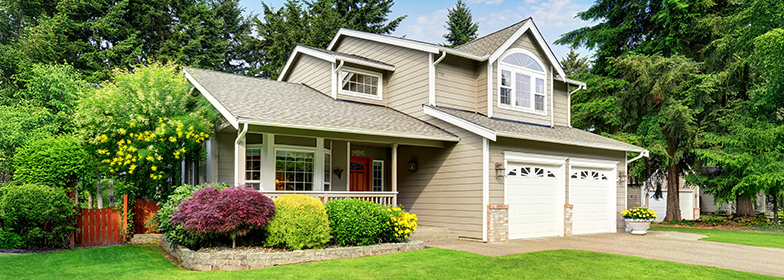
How do I buy an investment property?
Whether you’re looking to generate passive income or diversify your investment portfolio, an investment home can be a lucrative purchase, albeit one with the higher barrier to entry compared to other investments, including primary homes. That’s because mortgages on investment properties have stricter requirements. Even though investment properties carry some risks, you can still make money if you’re adequately prepared. Keep reading to discover how to boost your finances by investing in property the right way.
What is an investment property?
An investment property generates income from rentals or through a profitable sale. The owner typically doesn’t live in it; as opposed to a second or vacation home where the owner usually occupies them for some part of the year.
Here are three common usages for investment properties:
Diversifying a financial portfolio
Buying an investment property can be a savvy financial decision to strengthen your financial portfolio since the housing market is typically less volatile than the stock market and is likely to appreciate in value over time.
Additionally, the interest from your mortgage payments can be deducted as a legitimate business expense.
Fixing and flipping
Many people will buy an older home or a home that needs some TLC, renovate, and then sell it to make a profit.
Renting the property
Rentals are a great way to generate income. This can be incredibly lucrative if your property is in a desirable area, or the neighborhood attracts out-of-towners.
How is buying an investment home different than a primary home?
Investment properties are a bigger risk to lenders because the borrower will prioritize paying for their own residence first if their finances become strained. Expect higher income and credit score requirements, as well as a larger interest rate.
| Primary home | Investment home | |
|---|---|---|
| Credit score | 580 (FHA), 620 (Conventional) | 620+ (720+ if you already own 7 or more investment properties) |
| Down payment | 3.5% (FHA), 3% (Conventional), varies if using a down payment assistance program | 15-25% |
| Income requirements | None; though proof of consistent income is needed, and debt-to-income ratio of 36% or less is suggested | Depends on type of property (single family or multi-unit); cash reserves may be required |
It may not come as a surprise, but loan programs designed to facilitate housing access to first-time homebuyers or lower-income earners generally aren’t available for investment properties. This includes government programs like VA, USDA and FHA loans as well as down payment assistance programs.
How to finance an investment property
Investors typically take advantage of the flexible requirements of Conventional loans when buying property. Some lenders also offer special financing for repeat investors. The steps to qualify are similar to other mortgage applications.
Conventional loans
Some of the steps for Conventional loan financing mirror that of primary homes. However, investment properties require more down payment, higher credit scores and potentially cash reserves depending on your situation. Here’s how they vary:
- Occupancy type: Multi-unit properties such as duplexes come with larger down payment requirements than single-family homes. While 2-4 unit properties cap the maximum loan amount at 75% of the property value, you may finance up to 85% of the property value for single-family homes.
- Eligibility: Depending on whether this is your first time investing, you may have to provide proof showing cash reserves for a number of months. Jumbo loans could even require a year’s worth of savings. You may also be limited by the number of investment properties you can own.
- Income qualification: Lenders may take into account your future rental profits as part of your total income, allowing you to borrow more.
- Documentation: If you already have investment properties, prepare to present any and all documentation recording the specifics.
DSCR, a Non-QM option
Guild also offers the Debt-Service Coverage Ratio mortgage (DSCR), a Non-QM financing option for real estate investors who want to qualify for funding based on their property’s cash flow instead of personal income or employment verification. This is available for both buying and refinancing.
If you’re a full-time investor looking to borrow less than $2.5 million, it may provide easier access to financing if you plan on buying properties up to 4 units, but no more. Investors of short-term rentals and even non-warrantable condos can profit from this option.
The tax implications of selling an investment property
It pays to have a long-term plan when buying an investment property since the process of selling one isn’t all cash in your pocket. When selling, you’re subject to a capital gains tax if you’re selling the property for more than you bought it, which is very likely. Depending on your tax filing status and adjusted gross income, you could pay a hefty fee.
To avoid this, many investors opt for a 1031 exchange. This is essentially a swap between one property for another to delay or defer the tax until you sell. A middleman is often involved, and the swap needs to happen in a relatively short time frame. If done correctly, taxes are reduced or even eliminated when exchanging, as the profits roll into the new investment. So, if you’re thinking about financing an investment property, it’s likely that you’ll do it more than once.
If you want steady investment returns and have the funds to finance one, an investment property could be a major asset to your financial portfolio. If you’re ready to get started or just want to learn more about the process, get in touch with one of our knowledgeable loan officers near you.
The above information is for educational purposes only. All information, loan programs & interest rates are subject to change without notice. All loans subject to underwriter approval. Terms and conditions apply. Always consult an accountant or tax advisor for full eligibility requirements on tax deduction.
